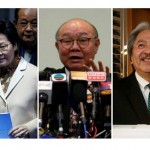On March 26, Hong Kong will know who will replace its Chief Executive, CY Leung. The ‘One Country, Two Systems’ political structure provides it with significant levels of autonomy within China: the city has its own legislation, levels of taxation, immigration controls, economic regulations and civil rights. Thus, the chief executive, compared to leaders of cities elsewhere in the world, has a great deal of scope to set the political and economic agenda.
Hong Kong selects its chief executive in a unique process centred around a 1200-member Election Committee. First, potential candidates need to gather at least 150 nominations from members of the committee to be able to stand for election. An election is then held across the whole committee: a candidate needs to win a majority of votes to win office. If no candidate wins an outright majority, the candidate with the least number of votes is eliminated, and a run-off vote is held. This is repeated until a candidate wins an outright majority.
The Election Committee is meant to be ‘broadly representative’ of Hong Kong society. In practice, most of its members represent the various industry groups in the city. Other represented groups include trade unions, the Legislative Council (the city’s legislative body), Hong Kong’s delegates to the National People’s Congress and the Chinese People’s Political Consultative Committee (China’s deliberative bodies), and other political groups. Many of these seats are themselves elected, albeit amongst very small constituencies.
Beijing has no direct presence on the Election Committee. However, the construction of its membership is tilted towards the pro-business, pro-China establishment. Thus, chief executive candidates from the ‘pan-Democrat’ opposition have found little traction among the Election Committee’s members.
The 2017 election of chief executive is the first since the failure of the 2014 political reform package. The proposed reforms would have replaced the Election Committee with a direct election of the chief executive amongst the general public. However, it would also have created a ‘Nomination Committee’ that would ultimately approve or disapprove candidates before the election. Many pro-democracy activists and politicians saw this as a backdoor mechanism for Beijing to influence, if not outright rig, the elections. The reform package failed in the face of public protest and blocking by opposition politicians.
In terms of candidates, the election of chief executive in 2017 is partly notable because of who is not running, namely the current chief executive, CY Leung. While Leung could have run for a second term, he is deeply unpopular not only among the opposition, who see him as too close to Beijing, but also amongst much of the establishment, which views him as an ineffective champion of their agenda. CY Leung’s administration was not particularly successful: it failed to pass several pro-establishment policies. Successive personal and administrative scandals lowered him in the eyes of the public while his attempts to discourage the city’s growing protest movement often only galvanised it further. Even before Leung announced that he would not run for re-election, establishment politicians like Jasper Tsang, President of Hong Kong’s Legislative Council, were openly discussing the need for another, less divisive candidate.
***
Three candidates have received the required number of nominations to stand for election. The first is Carrie Lam, former chief secretary–Hong Kong’s seniormost administrative officer–in CY Leung’s administration. Lam is seen as the most likely victor, having already secured support from several establishment groups on the Election Committee. However, she is perceived as a continuation of her unpopular former boss. The pro-democracy opposition has already refused to support her in any way, believing that Lam will not be willing to compromise with them on political reform (such as, removing the implementation of a Nomination Committee or allowing members of the public to nominate candidates).
The second is John Tsang, former Financial Secretary to CY Leung. Tsang has been embraced by elements of the opposition, who originally saw him as a viable alternative to Leung, and, later, Lam. Tsang announced his campaign early, even before Leung made it public that he would not stand for re-election. Tsang has beaten Lam in most public opinion polls, even though the public does not have any direct input on the election.
The third is Woo Kwok-hing, a retired senior judge. He was the first to announce his candidacy, positioning himself as an anti-Leung candidate. Like Tsang, he has been supported by the opposition, but is unlikely to get acceptance from either the establishment or Beijing due to his primary focus on political reform.
The upcoming election is interesting as it is the first one where the outcome is uncertain. While Lam is still the favourite to win, the presence of multiple establishment candidates, no incumbent, and an opposition willing to vote strategically may lead to an upset victory by Tsang.
Nicholas Gordon is a researcher at the Global Institute for Tomorrow in Hong Kong. He was a research intern at Gateway House in the summer of 2014. The views expressed here are his own.
This feature was exclusively written for Gateway House: Indian Council on Global Relations. You can read more exclusive features here.
For interview requests with the author, or for permission to republish, please contact outreach@gatewayhouse.in or 022 22023371.
© Copyright 2017 Gateway House: Indian Council on Global Relations. All rights reserved. Any unauthorized copying or reproduction is strictly prohibited.


